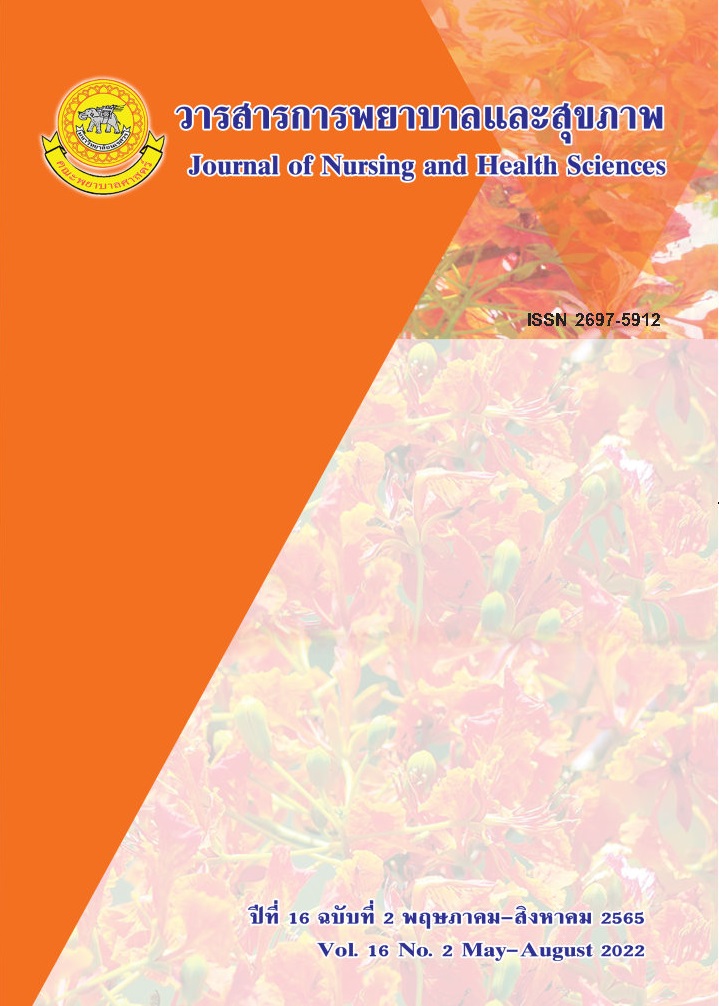ประสบการณ์การจัดการตนเองของผู้ป่วยเบาหวานชนิดที่ 2 ที่สามารถควบคุมระดับเอวันซีได้โดยสามารถหยุดรับประทานยาลดระดับน้ำตาลในเลือด
Main Article Content
บทคัดย่อ
การวิจัยเชิงคุณภาพนี้ มีวัตถุประสงค์เพื่อบรรยายประสบการณ์การจัดการตนเองของผู้ป่วยเบาหวานชนิดที่ 2 ที่สามารถหยุดการใช้ยาลดระดับน้ำตาลในเลือดได้ คัดเลือกผู้ให้ข้อมูลแบบเฉพาะเจาะจง จำนวน 12 คน โดยผู้ให้ข้อมูลเป็นผู้ป่วยเบาหวานชนิดที่ 2 ที่เข้าร่วมโครงการโรงเรียนเบาหวานบางระกำภูวดลโมเดล และสามารถหยุดการใช้ยาลดระดับน้ำตาลในเลือด เก็บรวบรวมข้อมูลโดยการสัมภาษณ์เชิงลึกแบบกึ่งโครงสร้าง วิเคราะห์ข้อมูลด้วยวิธีการวิเคราะห์เนื้อหา ผลการวิจัย พบว่า การจัดการตนเองผู้ป่วยเบาหวานชนิดที่ 2 ที่สามารถหยุดการใช้ยาลดระดับน้ำตาลในเลือดได้ ประกอบด้วย 3 ประเด็นหลัก ดังนี้ 1) การจัดการทางการรักษา ประกอบด้วย 3 ประเด็น ได้แก่ (1) ปรับปริมาณอาหารตามระดับน้ำตาลในเลือด (2) เรียนรู้และปรับพฤติกรรมจากกลุ่มเพื่อนในไลน์แอพลิเคชั่น และ (3) รู้ว่ามาถูกทางเมื่อน้ำหนักลดลง 2) การจัดการกับบทบาท ได้แก่ (1) ยอมรับการเปลี่ยนแปลงทั้งครอบครัว และ (2) ประกอบอาชีพเดิมได้อย่างมีประสิทธิภาพมากขึ้น และ 3) การจัดการกับอารมณ์ ได้แก่ (1) พยายามลดความเครียด และ (2) สร้างความหวังให้มุ่งมั่นปฏิบัติอย่างต่อเนื่อง ดังนั้น ประสบการณ์การจัดการตนเองของผู้ป่วยเบาหวานนี้ สามารถเป็นข้อมูลพื้นฐานสำหรับบุคลากรทีมสุขภาพเพื่อนำไปใช้ในการพัฒนารูปแบบการดูแลผู้ป่วยเบาหวานที่มีประสิทธิภาพต่อไป
Article Details

อนุญาตภายใต้เงื่อนไข Creative Commons Attribution-NonCommercial-NoDerivatives 4.0 International License.
เอกสารอ้างอิง
Andriyanto, A., Rekawati, E., & Rahmadiyah, D.C.
(2019). Increasing knowledge, attitudes, skills,
and glucose control in type-2 diabetic patients
through EMAS interventions. Nurse Media
Journal of Nursing, 9(2), 2019, 141-150. from http://
ejournal.undip.ac.id/index.php/medianers DOI:
14710/nmjn.v9i2.22989
Baiphimai, J., Leelukkanaveera, Y., & Srisuriyawet, R.
(2017). The effects of self-regulation by clinical
information program to glycemic control
behaviors score and glycosyted hemoglobin
level on uncontrolled type 2 diabetes. Journal of
Public Health Nursing, 31(3), 123-143. [In Thai].
Bennich, B.B.Roder, M.E., Overgaard, D., Egerod, I.,
Munch, L., Knop,F.K., Vilsboll, T., …Konradsen,
H. (2017). Supportive and non-supportive
interactions in families with a type 2 diabetes
patient: An integrative review. Diabetol Metab
Syndr,9,57. DOI 10.1186/s13098-017-0256-7
Butler, K., Schatz, D., & Hathaway, K. (2014).
Workplace checkup: Keeping patients with
diabetes employed and safe on the job. Clinical
Diabetes, 32(1), 44-48.
Chiangkhong, A., Duangchan, P., & Intarakamhang, U.
(2017). Health literacy in diabetic adult: Experience of diabetic patient and perspective on
health literacy. Kuakarun Journalof Nursing,
(2), 162-178. [in Thai].
Denduangjai, S. (2020). Diabetes and work. Retrieved
from:https://www.aoed.org/articles/2020/october/
ncd/
Guba, E., & Lincoln, Y. (1985). Naturalistic inquiry.
Newbury Park, CA: Sage.
Health Data Center. (2021). KPI report NCD clinic plus:
Percentage of controlled diabetes. Retrieved
from https://hdcservice.moph.go.th/hdc/main/
index. php [in Thai].
Jaisit, J., Meetam, R., & Kamkan, P. (2017). Effect of
self-management supporting programon self-management behaviors and hemoglobin A1C level
among persons withtype 2 diabetes. Journal of
Nursing Science & Health, 40(2), 65-73. [in Thai].
Kaiwikaikoson, A., Wanchai, A., Kaewsasri, A., &
Kuariyakul, A. (2018). Stress management of
patients with diabetes in Thailand: A systematic
review. Boromarajonani College of Nursing,
Uttaradit Journal,10(2), 1-16. [in Thai].
Lorig, K. R., & Holman, H. R. (2003). Self-management
education: History, definition,outcomes, and
mechanisms. Annals of Behavioral Medicine,
(1), 1-7.
Naowwan, W., & Iamprasert, A. (2020). Stress
managment and related factors of work life
quality management. Journal of Management
Science Review, 22(1), 223-232. [in Thai].
Norabin, N., Chanpen, U., & Sowat, C. (2020). The
experience in controlling blood sugarlevels for
type 2 diabetic patients, Journal of Preventive
Medicine Associationof Thailand, 10(2), 351-365.
[in Thai].
Panyathorn,K., Tajang, S., Sriboonpimsuay, W., &
Trongsri, C. (2020). Life style of diabetes patients:
A comparative study of good controlled and
uncontrolled group in Chiangyuen Health
Promoting Hospital, Udonthani Province.
Udonthani Hospital Medical Journal, 28(1),
-29. [in Thai].
Peimania, M., Monjazebib, F., Ghodssi-Ghassemabadic,
R., & Nasli-Esfahanic, E. (2017). A peer support
intervention in improving glycemic control in
patients with type 2 diabetes. Patient Education
and Counseling, https://doi.org/10.1016/j.pec.
10.007
Polpuak, P., & Chutipanyapron, N. (2018). Developments
of health behavior promotionmodel for controlling
blood sugar levels in diabetic patients.
Buddhachinaraj Medical Journal,35(3), 348-360.
[in Thai].
Saeedi R., Petersohn, I., Salpea, P., Malanda, B.,
Karuranga, S., Unwin, N., Colagiuri, ., ... Williams,
R. (2019). Global and regional diabetes
prevalence estimates for 2019 and projections
for 2030 and2045: Results from the International
Diabetes Federation Diabetes Atlas (9th ed.).
Diabetes Researchand Clinical Practice
Journal,157,1-8.
Srisaket, J., Chaisa, P., Wanchai, A., Meeboonmak Y.,
& Phokhwang-Just, W. (2017). Dietconsumption
behavior modification patterns to control blood
sugar levels ofpatientswith diabetes in Thailand:
A systematic review. EAU Heritage Journal
Science andTechnology, 11(2), 156-170. [in Thai].
Suparee, N., McGee, P., Khan, S., & Pinyopasakul,
W. (2014). Life-long battle: Perceptions of type
diabetes in Thailand. Chronic Illness 0(0) 1-13
DOI: 10.1177/1742395314526761
Suthinarakorn, W. (2013). Qualitative research:
Researchin alternative paradigm. Bangkok:
Siam-parithas publishing co., ltd. [in Thai].
Suwattanakul, T. (2018). Factors related to blood sugar
control among diabetes mellitus type 2 patients.
Journal of Health Systems Research, 12(3),
-522. [In Thai].
The Royal Colleague of Physicians of Thailand,
Diabetes Association of Thailand, The Endocrine
Society of Thailand, Department of Medical
Services & National Health Security office.
(2019). Clinical practiceguideline for diabetes
(3nded.). PathumThani: Romyen Publishing.
[in Thai].
Wanchai, A., Totharung,P., & Meebunmak, Y. (2020).
Self-management experiences ofpatientswith
type 2 diabetes mellitus living in rural area.
Nursing Journal of Ministryof PublicHealth, 30
(1), 69-81. [in Thai].
Wannasiri, T. (2016). Families relationship in self-care
promotion for uncontrolling blood sugar in type 2
diabetes. Kuakarun Journal of Nursing, 23(2),
-50. [in Thai].
Wungrath, J., & Autorn, N. (2021). Effectiveness of line
application and telephone-based counseling to
improve medication adherence: A randomized
control trial study among uncontrolled type 2
diabetes patients. Health Promotion Perspectives,
(4), 438-443.doi: 10.34172/hpp.2021.55 https://
hpp.tbzmed.ac.ir


